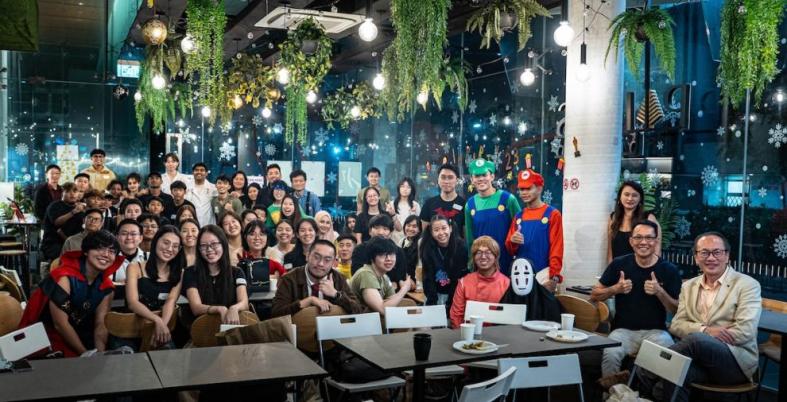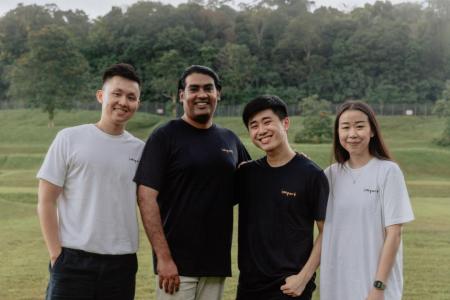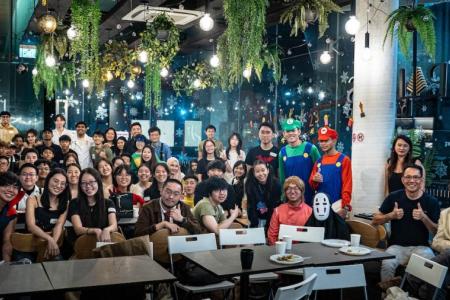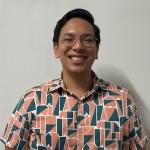Man's support for youth who erred creates butterfly effect
This National Day, TNP showcases not-so-ordinary Singaporeans who chart success their own way
NARASIMMAN TIVASHI MANI, 40
Impart executive director
Mr Narasimman, or Narash as he’s known to most, isn't your typical Singaporean.
He has dedicated himself to uplifting the lives of troubled youth, from leading a Boys Brigade company as a teenager to building a thriving organisation that empowers youth to become their best selves.
Impart provides holistic support for young people in three core areas: education, mental health care and community.
When I was 19, I was running a Boys Brigade company. I got into the Navy and was an Independent Duty Corpsman. I went to the US to study and when I came back, I could perform like a doctor within certain stipulations.
I led a Navy life but on weekends, I spent most of my time with the Boys Brigade, helping the boys grow into leaders. That's how I started my youth work.
Later on I thought about leaving the Navy to become a doctor, but I was sent on a covert operation with the submarine at the time I was supposed to be in an interview with the universities. I could not explain to them why I missed the interviews because I was on a covert operation.
I left the Navy when I was 28 and started going on medical missions overseas to help doctors and befriend children. On three of the medical missions I went to, people told me, "Wow, Narash, you have such a gift with children and youth."
I wanted to volunteer and do something. A volunteer position at the Singapore Boys' Hostel opened up and the volunteering stint became a full-time job.
Three years passed quickly and I wanted to see how I could really help them. Many of the boys received good help when they were inside, but I felt there was a gap in the support they received once they got out.
In the day, I was at the hostel, and at nights, I would help some of the boys who were already discharged from the hostel when they made distress calls.
That was when I met my co-founder Joshua Tay. He wanted to support the boys in the education journey following their discharge from the hostel. So this was an idea we mooted and eventually executed after a couple of years.
Impart was born out of my "night job".
What’s the biggest challenge you face in your day-to-day work?
Funding. In our earlier days as a non-profit, we weren't an Institute of Public Character (IPC), so we couldn't offer tax deductions, which posed some challenges in securing donations.

In December last year, we got our IPC status. We've been growing well and supported by Majurity Trust, which gave us seed funding to help us go to the next level. There were other sources like Our Singapore Fund and donors that really help us to do our work.
We are blessed to have all these people around us, including our volunteers. Not only have we worked with 1,000 young people, but we also have 1,000 volunteers. Our volunteers are our partners. Without them, we cannot reach out to the youth.

What's the most rewarding aspect of your work?
The first young person we helped in our education arm came back to help others. He volunteered for a while, then he became an intern and now he's part of our staff.
He's a trailblazer, we even have his brother with us, and they're all doing their workplace diploma programme in ITE. About one in five of the youth return to help others after going through volunteering stints or leadership training with us.

When we see these young people who overcame their own adversities and return to help others, their lived experiences are impactful and powerful.
How do you see your work contributing to the Singapore landscape?
We bring an alternative voice to how to care for young people, while being complementary. Some of the social services in Singapore are burning out, and we want to help them.
Impart strengthens the ecosystem of care for young people, creating a system that complements and supports social workers.
What's a favourite Singapore memory you cherish?
It was when I was in the Navy, on a course overseas. When they announced me as the valedictorian, they called out: “Singapore!”
It was a very powerful moment because they didn't call up my name. An that moment, I realised I was representing my nation. I felt so proud to be Singaporean and to have achieved this. It meant a lot for me.
What’s your favourite Singapore dish?
I love the duck rice from Ah Seng Duck Rice. It's a must-have when I go to Geylang.
What makes you the proudest about being Singaporean?
We have over a thousand social service agencies. For a very small country, we really have a lot of social service agencies looking at various needs of the people and voices that are not heard, like the migrant workers, children, the youth, seniors.
I'm really proud that we’re not a country that will leave that 1 per cent behind. We really care for them.
What is your hope for Singapore?
It's important for Singapore to understand the roots that we came from and understand that we're not of a Western culture. We need to be very conscious to not allow Western mindsets to permeate through our own way of thinking.
It was not an easy journey for us to get here. It is important for us to value the past and progress while carrying that sense of appreciation for how we made it.
I'm not saying certain things cannot change, but I think it's important for everyone to recognise how we got here.
Get The New Paper on your phone with the free TNP app. Download from the Apple App Store or Google Play Store now






